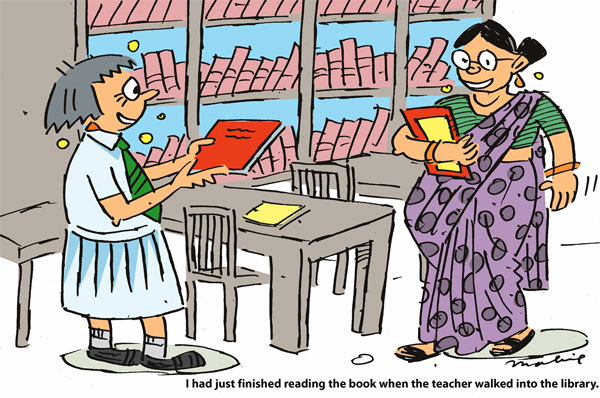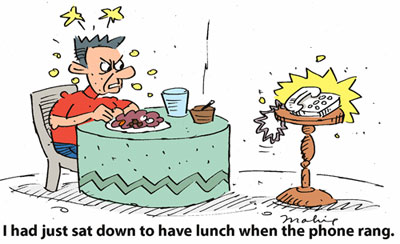|

by R. S. Karunaratne
Past perfect tense
We use the past perfect tense for an action or situation that
happened earlier.
When we entered the classroom, the lecture had begun.
The students came up with excellent ideas after they had discussed
the problem with the Vice Chancellor.

I had just finished reading the book when the teacher walked into the
library.
The villagers had already assembled at the Village Council when the
minister arrived.
Everybody had expected Maxwell to propose a vote of thanks but he
declined to do so.
We use the past perfect tense with words such as ‘already’ and ‘just’
to refer to actions which were completed before a specific time in the
past.
When we arrived at the meeting, the chief guest had already left.
When the students attended school, the teachers had already come.
The child had already closed his eyes tightly so he couldn’t see what
happened.
I had just sat down to have lunch when the phone rang.
She had just posted the letter when the postman came.
We use the past perfect tense with ‘always’ and ‘more than once’ to
refer to repeated actions in the past.
I had always suspected that Lionel was the root cause of all the
problems.
Before I left for Australia, father had reminded me more than once to
check the necessary documents.
Sam and I had always disagreed about the methods used to give up
smoking.
[Activity]
Fill in the blanks with the past perfect form of the verbs given in
brackets. Check your answers with the key.
1. Tom’s father ............... him not to go abroad till he was 25.
(advise)
2. Susil ............... herself a cup of coffee when the phone rang.
(pour)
3. John met Mary in Canada in 2000. He .............. her ten years
before. (see)
4. When the watcher ............... the gate we decided to remain
indoors. (close)
5. When Neela ............... her song she sat down. (sing)
6. When he ............... all the documents he said he was leaving.
(examine)

7. The police officer refused to leave my house until he
.............. all the inmates. (question)
8. Before he ............... for ten minutes, he complained of some
trouble. (speak)
9. Although Piyal went to university he ................. nothing
there. (learn)
10. When I ............... the work, I was transferred to a remote area.
(learn)
[Key]
1. had advised
2. had poured
3. had last seen
4. had closed
5. had sung
6. had examined
7. had questioned
8. had spoken
9. had learnt
10. had learnt
Starters:
Use of prepositions
[Part 5]
The vast number of nouns, adjectives and verbs outweigh the small
number of prepositions used in English. However, prepositions play a
major role in the construction of sentences.
[Under]
If a person or thing is under something, they are directly below or
beneath it.
There were some empty bottles under the table.
The tiger was hiding under a bush.
We use under to say that a person or thing is being affected by
something.

The strike is over and everything is under control.
“You’re under arrest,” the police officer told him.
Some school principals are under investigations for accepting bribes.
Some people write to the press under a pseudonym, without giving
their real names.
A well-known writer contributed a series of articles to the Evening
Observer under a pseudonym.
If somebody is under a particular age, they are less than the age
mentioned.
Children under 17 are not eligible to compete.
[In]
Something that is in something else is enclosed by it or surrounded
by it.
Brian put some paint in a container.
You will find the document in my drawer.
Put the file back in my briefcase.
Babies love to spend a long time in the bath.
I saw Rashmi travelling in a car.
You will find her in the kitchen.
When we say that somebody is in a piece of clothing he or she is
wearing it.
I saw my sister in a dark green saree.
A man dressed in black was at the gate.
Something that is covered in something else has that thing over its
surface.
The walls of his room were covered in dirt.
If something is in a document, book, play or film, you can read it, see
it or hear it.
You haven’t mentioned your trip to Mannar in your letter.
You will find his telephone number in the directory.
If you see something in a mirror, you see its reflection.
Savitry looked at herself in the large mirror.
If you are in a group, you are part of it.
Have you ever experienced the excitement of being in a crowd?
If you are in a play, you are one of its actors.
Nelson played the role of a doctor in a comedy.
If something happens in a particular year or month, it happens during
that time.
Grandfather was born in 1939.
We use in to indicate that an emotion causes somebody to do something.
Little Shyma started leaping up and down in excitement.
We use in to indicate something that we believe in.
I don’t believe in ghosts.
Rationalists don’t believe in dreams.
Making verbs from nouns
A good knowledge of word families will help you to improve your
vocabulary.
Find the relevant verbs for the nouns listed in column ‘A’ and write
them in column ‘B’. Check your answers with the key.
[Column A] [Column B]
1. Suffering .................
2. Suggestion .................
. Supplier .................
4. Supporter .................
5. Supposition .................
6. Surroundings .................
7. Survival .................
8. Suspicion .................
9. Swearing .................
10. Sweet .................
11. Swimming .................
12. Symbol .................
13. Sympathy .................
14. System .................
15. Teacher .................
16. Theory .................
17. Thickness .................
18. Thinness .................
19. Threat .................
20. Tightness .................
21. Tiredness .................
22. Title .................
23. Toughness .................
24. Training .................
25. Transportation .................
26. Treatment .................
27. Trickery .................
28. Understanding .................
29. Usage .................
30. Valuation .................
[Key]
1. suffer 2. suggest 3. supply 4. support 5. suppose 6. surround 7.
survive 8. suspect 9. swear 10. sweeten 11. swim 12. symbolize 13.
sympathize 14. systematize 15. teach 16. theorize 17. thicken 18. thin
19. threaten 20. tighten 21. tire 22. entitle 23. toughen 24. train 25.
transport 26. treat 27. trick 28. understand 29. use 30. value |



